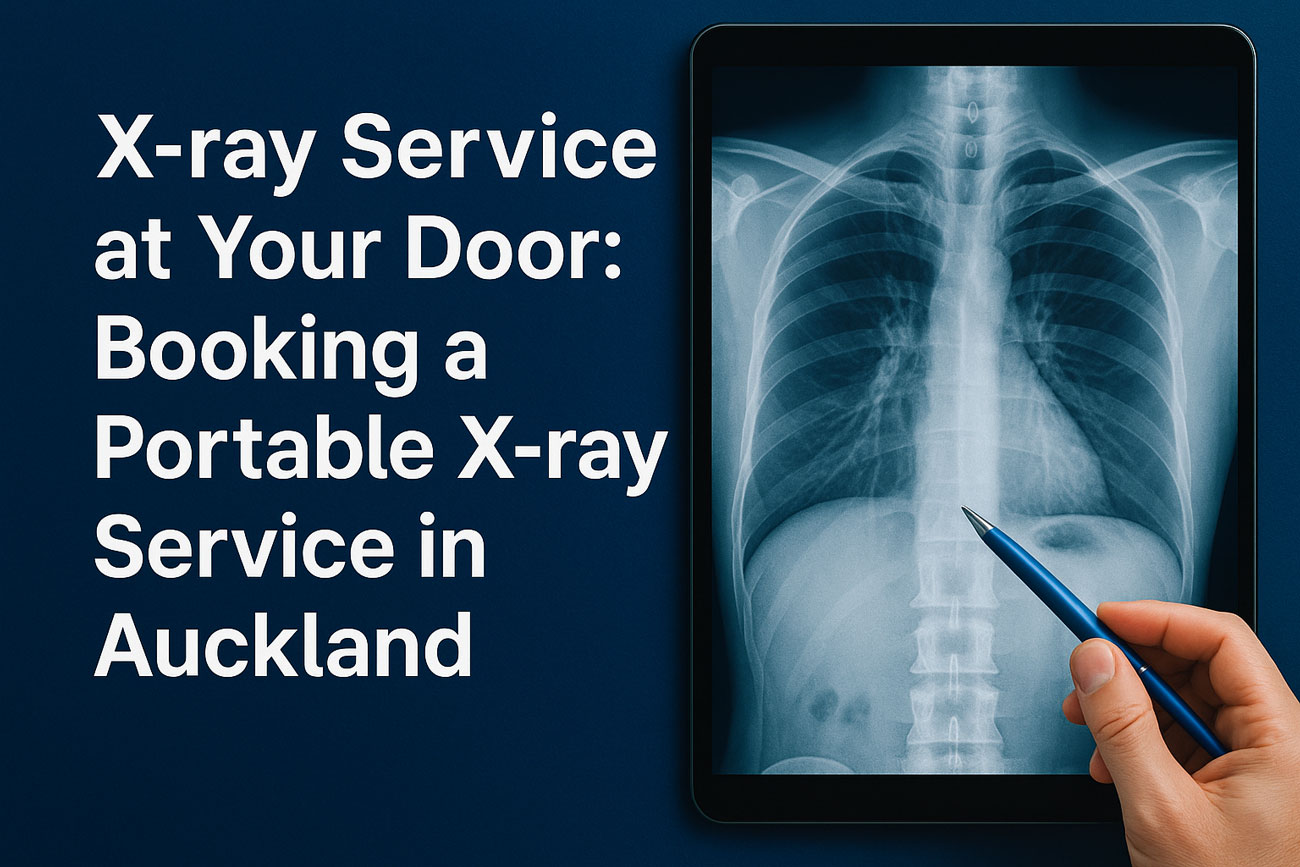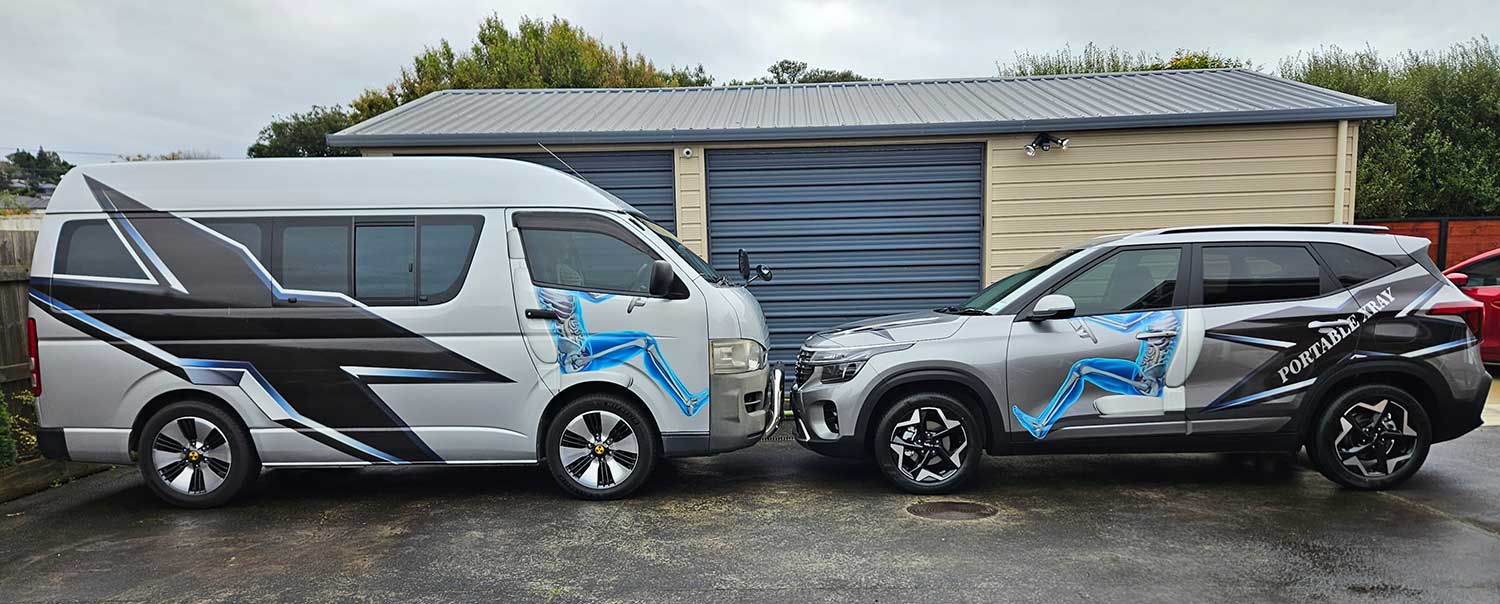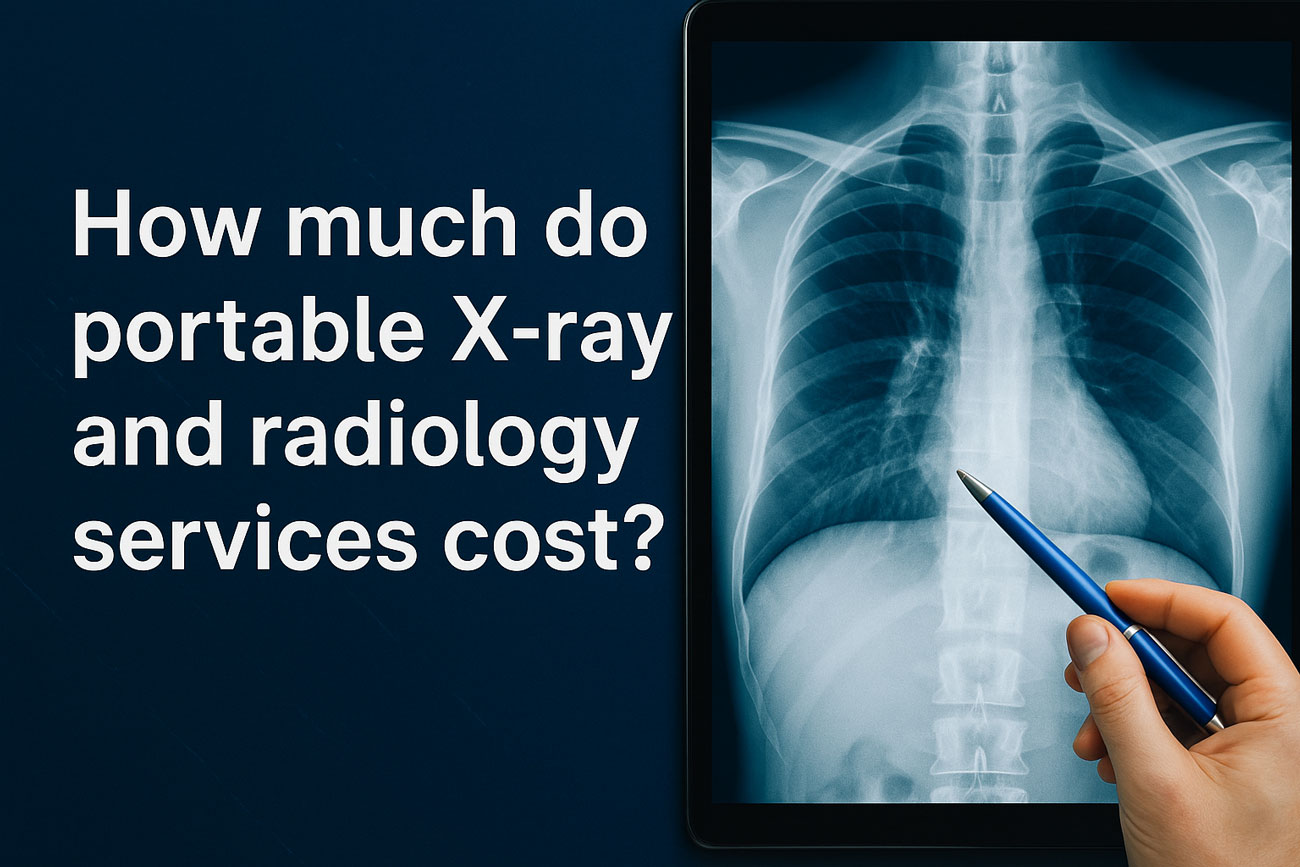
26 Nov X-ray Service at Your Door: Booking a Portable X-ray Service in Auckland
Radiology & X-ray Imaging: How to Book a Portable Scan from a Local Portable X-ray Service in Auckland
Access to timely radiology services is crucial for diagnosing, monitoring, and managing a range of health conditions. With mobile imaging becoming more accessible across New Zealand, patients can now undergo advanced diagnostic scans like x-rays and ultrasounds from the comfort of their own homes. This development is particularly beneficial for those with mobility issues or those living in areas with limited access to hospital-based imaging centres. Portable x-ray services are offering a new level of convenience, reducing the need to travel while still ensuring accurate, up-to-date imaging results.
Mobile imaging services are not just about convenience — they deliver expert-level diagnostic imaging with the same quality as fixed-site radiology clinics. Equipped with advanced imaging technology and operated by qualified medical imaging technologists, these mobile units provide essential support to clinicians, physiotherapists, and other healthcare providers. From initial injury assessment to ongoing cancer treatment planning, radiology teams can offer a comprehensive range of diagnostic options, including x-rays, CT, MRI, and ultrasound, directly at a patient’s location. This approach helps ensure seamless patient care and fast, reliable diagnoses.
How do I book an x-ray appointment from a portable imaging service in Auckland?
What information is needed to book an x-ray appointment and referral requirements
To book an appointment for mobile imaging, patients typically require a valid referral from a healthcare professional such as a GP, physiotherapist, osteopath, or specialist. The referral should outline the area being examined, the reason for the scan, and any relevant clinical history. This helps the radiology provider assign the appropriate imaging modality and ensures the medical imaging technologist is well-prepared on arrival. Booking teams may also ask for the patient’s full name, date of birth, National Health Index (NHI) number, contact details, and any mobility or access issues at the property.
Once the referral is submitted, the radiology provider’s team will confirm whether the requested service is suitable for mobile delivery. Some examinations, like x-rays or certain ultrasound procedures, are well-suited to mobile delivery, while others—such as CT or MRI—may require attendance at a fixed clinic due to equipment constraints. Clear communication at the booking stage ensures patients are matched with the right service and helps streamline the diagnostic process.
How to choose the right imaging services: x-ray, ultrasound, CT or MRI
Selecting the correct imaging service depends on the type of injury or medical condition being assessed. An x-ray is typically used as a first step for bone-related injuries, detecting fractures, assessing joint alignment, or identifying foreign objects. Ultrasound is a non-invasive imaging procedure that uses sound waves to assess soft tissues, organs, and vascular systems. CT and MRI scans offer more detailed, cross-sectional imaging and are often used for neurological, abdominal, or cancer-related diagnostics.
Patients should always consult their referring clinician to determine the most appropriate modality. Imaging technology has advanced significantly, with some mobile units now offering multiple services within one visit. In most cases, a health practitioner will recommend the imaging type based on symptoms, injury location, and the level of detail required to reach a diagnosis. Accurate imaging supports timely treatment decisions and helps avoid unnecessary or repeat scans.
Steps to book an appointment online or by phone with a radiology provider
Most mobile imaging providers offer a straightforward booking process either online or by phone. Patients or their referrers can upload the referral via a secure portal or email, followed by a call with a patient care coordinator to confirm the details. The booking team will work with the patient to schedule an appropriate time for the visit, taking into account their location and any mobility considerations. Some services can provide same-day or next-day appointments, particularly in urban areas.
Once confirmed, patients receive information on how to prepare for the scan and what to expect. Reminders are often sent via text or email, and the imaging team may contact the patient shortly before arrival. Booking a mobile scan is designed to be seamless, reducing waiting times and bringing expert diagnostic services directly to the patient’s doorstep.
What should I expect during my radiology appointment and x-ray examination?
Preparation for the scan: referral, clothing and patient care instructions
Before the appointment, patients are usually advised to wear loose-fitting clothing and to remove any jewellery or metal items that might interfere with imaging. Depending on the type of scan, fasting may be required — particularly for certain abdominal ultrasounds. The booking team will provide any specific preparation instructions based on the scan type and referral.
The imaging technologist will confirm the referral details and explain the process before beginning. They will also ensure the patient is positioned comfortably and provide clear guidance throughout the procedure. Ensuring a calm, respectful environment helps improve the accuracy of the imaging and supports patient wellbeing, especially for those unfamiliar with medical procedures.
What happens during an x-ray or other imaging examination with a medical imaging technologist
During the examination, the medical imaging technologist will position the patient and the imaging equipment according to the area being examined. In the case of x-rays, a brief exposure to radiation captures high-resolution images of bones or soft tissue. The procedure typically takes only a few minutes and is painless. For ultrasound, a conductive gel is applied to the skin, and a handheld transducer is moved over the area to capture internal images in real time.
Technologists are trained to maintain safety standards and ensure the exposure to radiation is kept to the absolute minimum necessary. They will check image quality on site and may repeat views if needed. Once complete, the images are uploaded securely to the radiologist for interpretation, and the results are typically available within 24 to 48 hours depending on the urgency of the case.
Is the procedure painless and how long will the radiology appointment take?
Radiology procedures such as x-rays and ultrasound are generally painless. There may be slight discomfort if you need to hold an awkward position or if the area being examined is already injured or swollen. Most x-ray appointments take between 10 and 30 minutes, while ultrasound scans can take a little longer depending on the organ or system being assessed.
CT and MRI scans, when required, may take 30–60 minutes and are usually performed at a specialist imaging centre. Mobile imaging services focus on keeping the appointment process quick and efficient while upholding patient comfort. With well-trained technologists and up-to-date equipment, patients can expect a professional and reassuring experience.

Which radiology services and specialised imaging are available from a portable X-Ray service?
Range of diagnostic imaging services: x-ray services, ultrasound, CT and MRI
Portable radiology services primarily focus on providing x-rays and select ultrasound examinations at a patient’s location. These include musculoskeletal x-rays, chest x-rays, and abdominal or vascular ultrasounds. While CT and MRI require more complex machinery and are generally conducted at radiology clinics, some mobile units are equipped with more advanced options for specific cases or in hospital-based mobile environments.
This range of diagnostic imaging services allows mobile providers to meet the needs of patients recovering at home, those with limited mobility, or people in aged care facilities. By bringing diagnostic services closer to home, mobile radiology reduces delays and enhances continuity of care, ensuring that results are delivered promptly and accurately.
State-of-the-art radiology equipment and advanced imaging technology used
Mobile imaging services use state-of-the-art equipment designed for portability without compromising on image clarity. Portable x-ray units use digital radiography (DR) technology to produce high-resolution images immediately, which are reviewed by radiologists via secure platforms. Mobile ultrasound machines offer real-time imaging with Doppler functionality and are compact enough to be deployed in almost any home or care facility environment.
These diagnostic units are fully compliant with safety standards and radiation control regulations. Despite their compact size, the imaging technology used is on par with what you’d find in major radiology centres. This means patients receive quality diagnostic imaging, even when accessing services outside of a traditional clinic setting.
Specialised radiology and expert radiologists for complex diagnoses
Behind every portable imaging service is a network of radiologists who specialise in interpreting medical imaging results. These professionals include musculoskeletal experts, chest and cardiac radiologists, and specialists in neuroendocrine and oncological diagnostics. Their expertise ensures that even complex cases are interpreted with accuracy, helping guide treatment plans for conditions ranging from fractures to cancer.
Access to expert radiologists means that even scans performed outside of a hospital setting are interpreted at the highest standard. Their reports are returned to the referring clinician, who will discuss the findings with the patient and outline any follow-up steps. This ensures the entire diagnostic pathway remains cohesive and reliable.
Do I need a referral and how do referrals affect booking and results?
When a health practitioner or medical professional should provide a referral
In most cases, a referral is required before an x-ray or other diagnostic imaging service can be booked. This referral ensures that the examination is clinically justified and targeted to the patient’s specific needs. Health practitioners such as GPs, physiotherapists, osteopaths, chiropractors, and medical specialists are authorised to refer patients for radiology services. The referral must clearly identify the area being examined and include the patient’s relevant history or symptoms.
A valid referral not only ensures proper use of imaging resources but also aligns the scan with appropriate follow-up care. Referrals help safeguard against unnecessary radiation exposure and guide the radiologist in producing an accurate report tailored to the clinical question being asked. Without one, patients may not be able to access services like x-ray, ultrasound, or advanced imaging such as CT or MRI.
How referrals speed up booking and ensure appropriate imaging examinations
Having a referral ready before booking speeds up the entire appointment process. It enables the radiology provider to triage cases, allocate resources efficiently, and assign a modality suitable for the condition in question. The referral provides clarity for the booking team, helping avoid delays or the need to reschedule due to incomplete information.
In some cases, urgent referrals may lead to priority bookings, ensuring rapid imaging for acute injuries or suspected serious conditions. Clear documentation from the referrer reduces the chance of incorrect scan selection and enhances diagnostic accuracy. Patients benefit from a smoother, more seamless process from booking to results delivery.
Receiving and understanding radiology results from your provider or radiologist
Once the scan is complete, a qualified radiologist interprets the images and prepares a report for the referring clinician. Patients do not usually receive results directly from the imaging provider but are encouraged to follow up with their health professional, who can explain the findings and discuss next steps. This ensures results are placed within the context of the patient’s overall health.
Turnaround times vary based on urgency but are often within 24 to 48 hours. For non-urgent examinations, the timeframe might be longer. If further imaging is needed, the clinician can make a new referral based on the initial report. Receiving clear, timely results from a trusted source is an essential part of modern medical imaging services.

How much do portable x-ray and radiology services cost in Auckland?
Factors that affect pricing: type of scan, specialist involvement and equipment
The cost of radiology services varies depending on the type of scan, the equipment involved, and whether a specialist interpretation is required. Simple x-rays are generally the most affordable, while CT or MRI scans incur higher fees due to the complexity of the technology and level of expertise involved. Some advanced imaging services also require contrast dyes, which can increase the cost.
Portable services may include an additional fee for travel, especially in rural areas or locations outside standard coverage zones. However, these services reduce indirect costs such as transport or lost work hours. Clear communication with the provider beforehand can help avoid surprises and ensure the service meets both medical and financial expectations.
Insurance, government funding and out-of-pocket costs for imaging services
In many cases, radiology services are covered by insurance or funded through public health programmes. Eligibility depends on factors such as age, injury type, or ACC approval. Some private health insurers cover all or part of the cost of imaging, including specialist reporting. Patients should always check with their provider to understand what’s included in their plan.
Out-of-pocket costs may apply when services fall outside public funding or are delivered privately. Mobile imaging is increasingly accessible through a combination of private payment and third-party funding, making it a viable option for those seeking faster service or greater convenience. Always ask the radiology provider for a fee schedule upfront.
Tips to find clarity on fees and compare portable radiology providers in Auckland
To get clarity on pricing, patients should request a full breakdown of fees before booking. This includes scan costs, any travel surcharges for mobile services, and specialist interpretation fees. Comparing multiple providers can also help identify the best value, especially if time and convenience are key concerns.
Reputation, experience, and available imaging modalities should be considered when comparing mobile imaging services. While price is important, choosing a provider with qualified technologists, experienced radiologists, and quality imaging equipment will ensure the best outcomes. Clarity around costs, preparation, and follow-up support contributes to a better overall diagnostic experience.
What are common FAQs about radiology, radiation safety and patient care?
Is radiation used in x-ray and CT safe for adults and children?
Modern x-ray and CT scans use very low doses of radiation, and safety protocols are in place to minimise exposure. These imaging modalities are carefully controlled to ensure the radiation dose is kept as low as reasonably achievable (ALARA), balancing diagnostic benefit with patient safety. For most adults, the amount of radiation in a routine x-ray is minimal and presents no health risk.
For children, extra precautions are taken due to their developing tissues. Paediatric imaging often uses adjusted techniques and lower exposure settings. In all cases, radiology teams will ensure that scans are only performed when clinically necessary and that alternative, non-radiation imaging such as ultrasound is considered when appropriate.
How radiology teams ensure patient care, comfort and accurate diagnoses
Radiology teams are trained not only in the use of advanced imaging equipment but also in patient care and communication. From the moment of arrival, technologists ensure patients feel informed, respected, and comfortable. Detailed instructions and gentle guidance help reduce anxiety and contribute to better scan results.
Patient comfort is especially important in mobile imaging settings, where people may be recovering at home or in aged care. Technologists are skilled at working in diverse environments and adapting to patient needs while maintaining high standards of professionalism. Accurate diagnoses start with clear images, and that depends on patient care as much as equipment.
Frequently asked questions about booking, results turnaround and follow-up imaging
Patients commonly ask how soon they can book, how quickly they’ll receive results, and whether a follow-up scan will be needed. Booking times vary by provider but can often be arranged within 24–72 hours. Urgent referrals may be prioritised. Results are usually sent to the referring clinician within 1–2 business days, depending on the scan type and reporting workload.
Follow-up imaging may be recommended if initial results are inconclusive or if further investigation is required. Patients should always discuss their results with their clinician, who can determine the next steps. Imaging services are just one part of the diagnostic pathway, and effective communication between providers ensures the best patient outcomes.
Conclusion
Radiology and mobile x-ray imaging services are transforming the way healthcare is delivered across New Zealand. From advanced imaging to rapid diagnostics, mobile units allow patients to access professional care without travelling long distances or navigating clinical environments. Whether it’s for injury assessment, cancer treatment planning, or routine diagnostic checks, medical imaging is bringing accurate, clear results closer to where patients live and recover.
Portable X-ray Services offer a seamless, high-quality alternative for those seeking convenience without compromising on diagnostic standards. If you’re looking for trusted radiology services at home, in aged care, or outside the city, consider how mobile imaging can meet your needs. It’s time to bring diagnostics to your doorstep with confidence.
